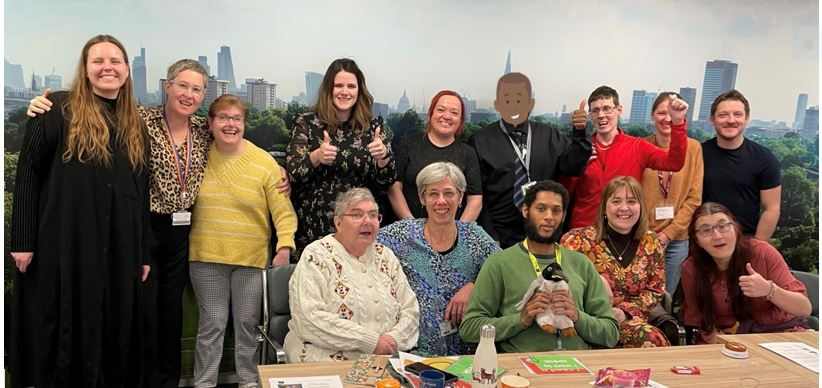15. The difference a year makes
- Apr 13, 2023
- 3 min read
Written by Prof Irene Tuffrey-Wijne, Project Lead, Kingston University.

How much can happen in a year? Here’s what happened on 1st April 2022.
For a long time, I had wanted to do a proper study on involving people with learning disabilities in choices at the end of life. We had spent 18 months of talking through ideas, building collaborations, planning, costing, submitting funding proposals… and finally, it was a YES from the National Institute of Health and Care Research.
After all that planning, The Victoria & Stuart Project got underway on 1st April 2022. First day of a two-year project. New staff starting their new job. Is it possible to get excited about end-of-life issues? Well, we were. But we were also feeling somewhat daunted, because there was so much to do. There were so many people involved. So many balls to keep up in the air.
Also on 1st April 2022, I was in hospital for a second mastectomy. I hadn’t seen that coming, but when it came, I was only given a couple of weeks’ notice of a looming period of extended sick leave. I won’t go into details (if you are really keen to be distracted, you can read about that here).
But here we all are three months later, when I returned to work and found The Victoria & Stuart Project safely out of the starting blocks. See? Everyone is still smiling. Credit to everyone, but a special mention for Becky who took over the steering wheel and kept the show on the road.

We were at preparation stage. There were focus groups to be organised (to find out people’s opinions and experiences of end of life care planning). We wanted to involve more people, especially more people with learning disabilities. We knew that within the first year, we had to start working with a co-production group, whose job it would be to decide what would REALLY help people to be involved in important end of life choices and decisions. Could we do it…?
Looking back at that time, I can’t believe how far we have come in just a year. In our focus groups, we have listened to people with learning disabilities, families, support workers, service managers, doctors, nurses and policy makers (and told you about it in last month’s webinar). We have scoured the internet and the literature, asked around, and looked for as many existing resources as we could find (you can hear about that in next week’s webinar – do join us! Tuesday 18th April at noon).
We got together an extraordinary group of people to help us work out what the best approaches and resources are. The “All Together Group” meets about once a month between January and June this year. Every time they meet, our minds are buzzing with new ideas – and with a slight panic when old ideas are thrown out the window. Will we ever get there?

I am confident that we will. In the autumn of 2023, staff and people with learning disabilities in our partner organisations (Dimensions and MacIntyre) will start testing our “toolkit”. The fact that I cannot yet tell you exactly what will be in that toolkit is both scary and exciting. We really, really need the help of our All Together Group (and also YOUR help in due course, so stay with us).
We have asked our funders for a bit of extra money, so we can be sure to include the perspectives of people from minority ethnic communities (if you can help us, please get in touch with Andrea or myself). We also asked for some extra money to be able to test our resources in smaller organisations.
I thought I knew about end of life care planning, but I have learnt so much in this past year.
I’ve learnt that doing a project like this without involving people with learning disabilities, and those that support them, would be ridiculous and pointless.
I’ve learnt that “end of life care planning” means different things to different people. We are not all singing from the same hymn sheet. No wonder there’s a cacophony at times.
I thought I no longer made assumptions, but I’ve learnt that I still do (there I was, showing people a couple of slides with what I thought were easy words, and they had no idea what I meant).
I’ve learnt that lots of people want to talk about dying – and lots of people don’t.
Actually, let me stop there, as this list could go on – and on – and on.
But one more thing perhaps… I’ve also learnt that it is possible to have cancer twice and then forget all about it. What was I doing again, a year ago? Hang on a minute – ah yes, mastectomy. So here is the other thing I’ve learnt. You can have bits chopped off… and feel lighter and happier.
Here’s to Year 2 of The Victoria & Stuart Project.





Comments